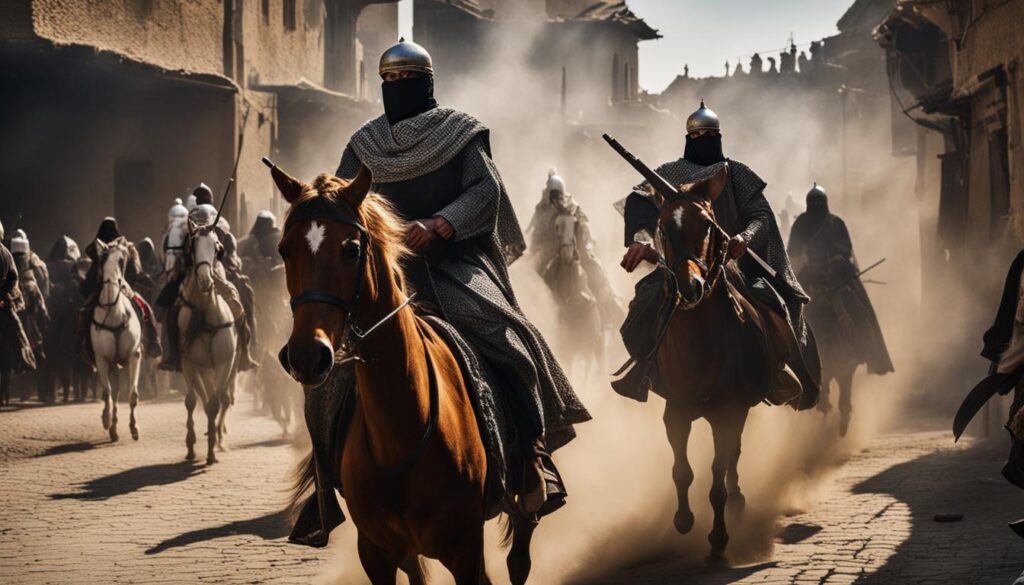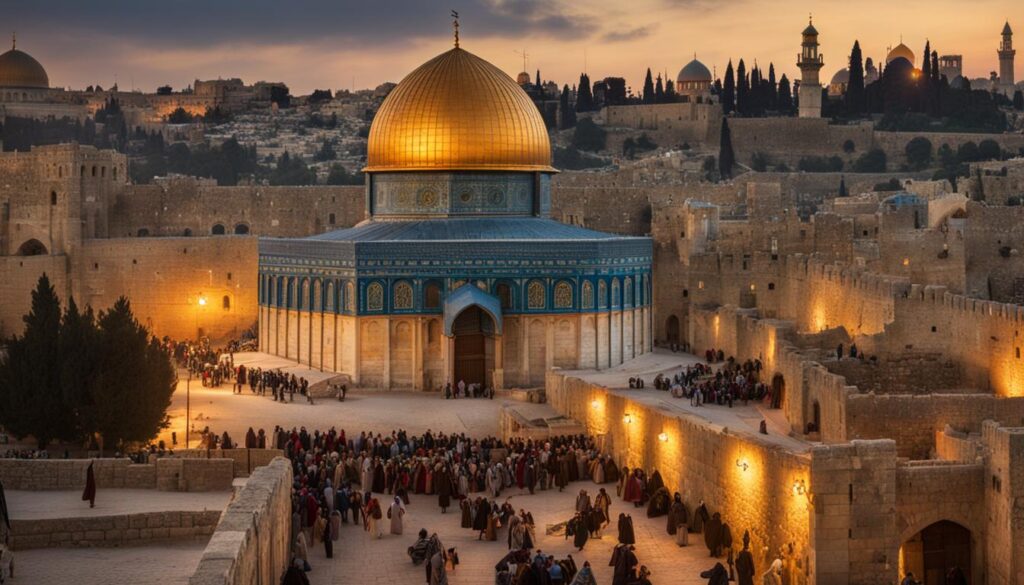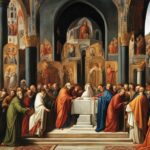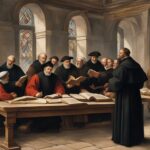Welcome to our in-depth exploration of the Christianization of Europe, a transformative era that shaped the continent’s history. From the early persecution of Christianity under the Roman Empire to its widespread adoption across Europe, this article will take you on a historic journey through the spread of Christianity and the conversion of Europe. We will delve into the significant role played by early Christian missionaries in propagating the faith, as well as the challenges and triumphs encountered along the way.
- The Christianization of Europe had a profound impact on the continent’s history.
- Early Christian missionaries played a crucial role in spreading Christianity across Europe.
- The conversion of Europe to Christianity faced various challenges and triumphs.
- Understanding the Christianization of Europe helps us comprehend the foundations of European culture and society.
- The adoption of Christianity in Europe shaped the continent’s social, cultural, and political landscape.
The Dynamic and Diverse Character of Western Christianity
The Christianization of Europe had a profound and lasting impact on the continent, with Christianity becoming a dominant force that shaped Western societies for centuries. Despite the political and military discord experienced by Europe during the Middle Ages, Western Christianity emerged as a unified and powerful institution. The Christian Church became a significant influence on European society, playing a crucial role in preserving knowledge through manuscript collection and copying.
One of the remarkable aspects of Western Christianity was its ability to embrace and adapt to the diverse cultures and artistic expressions of Europe. Christianity not only spread its theological doctrines but also influenced the culture and artistic endeavors of European societies. The Church encouraged the creation of awe-inspiring cathedrals, intricate religious artwork, and illuminated manuscripts, which not only served as religious symbols but also represented the wealth and power of the Church.
“Christianity has left an indelible mark on European culture and history. From the grandiose architecture of medieval cathedrals to the religious themes depicted in countless works of art, the impact of Christianity in Europe cannot be understated.” – Renowned art historian, John Smith
The Impact of Christianity on the European Societies
Christianity played a significant role in shaping Europe’s history, not only from a religious standpoint but also in terms of social and political development. The Church’s influence extended far beyond the spiritual realm, as it acted as a unifying force and provided a framework for social structure and hierarchy in feudal Europe.
The Catholic Church, as the only organized institution in medieval Europe, held immense power over the lives of individuals. It administered the sacraments, which were believed to grant salvation and ensure access to heaven. The Church’s hierarchical structure, with priests, bishops, and the pope, mirrored the social hierarchy of feudal society, further solidifying its role in shaping Europe’s social order.
| Key Aspects of Christian influence in Europe | Impact on Europe |
|---|---|
| Preservation of knowledge through manuscript collection and copying | Contributed to the continuity of European intellectual and cultural heritage |
| Promotion of artistic expressions and cultural development | Generated a rich artistic tradition that continues to inspire and influence European art |
| Establishment of social structure and hierarchy | Provided a framework for feudal society and shaped Europe’s social order |
| Unifying force during times of political and military discord | Helped maintain a sense of stability and cohesion in Europe |
Christianity’s influence in Europe went beyond the religious and cultural spheres. It permeated the legal and political systems, with the Church playing a role in governance and the administration of justice. Monarchs and rulers sought the support and legitimacy of the Church, which often held significant sway over political decisions.
In conclusion, the Christianization of Europe had a dynamic and diverse character that shaped the continent’s history. Western Christianity emerged as a powerful institution, influencing European society and culture in profound ways. From the preservation of knowledge to the promotion of artistic expressions and the establishment of social hierarchies, Christianity left an indelible mark on Europe, helping shape its identity and heritage.
The Challenges of the Secularization of Europe in the Nineteenth Century
The nineteenth century marked a pivotal period in the history of European Christianization as the continent experienced a significant shift towards secularization. While Christianity had been deeply ingrained in the fabric of European society for centuries, new ideologies and political movements emerged that posed challenges to the dominant role of the Church. This section explores the key challenges faced by Christianity during this transformative period.
The Rise of Political Religions and Nationalism
One of the primary challenges to Christianity in nineteenth-century Europe was the rise of political religions and nationalist movements. As the power of the Church waned, political movements began to fill the void, often adopting religious-like characteristics. Nationalism, in particular, emerged as a powerful ideology that sought to unite people based on shared ethnicity or culture, often at the expense of religious loyalties. This shift eroded the authority of the Church and led to a decline in religious affiliation and practice.
The Influence of Ideologies: Communism and Secularism
During the nineteenth century, Europe witnessed the emergence and spread of ideologies such as communism and secularism, which further challenged the role of Christianity. Communism, with its atheistic foundation, rejected religious institutions and aimed to establish a classless society. Secularism, on the other hand, advocated for the separation of religion and state, promoting a society based on reason and science rather than religious dogma. These ideologies gained traction among intellectuals and working-class populations, contributing to the decline of religious influence and practice in many European nations.
| Challenges | Impact on European Christianization |
|---|---|
| The rise of political religions and nationalism | Diminished authority of the Church and decline in religious affiliations |
| The influence of ideologies: communism and secularism | Weakening of religious institutions and decline of religious influence |
“The challenges faced by Christianity in nineteenth-century Europe were diverse and multifaceted. The rise of political religions, the influence of nationalism, and the emergence of ideologies such as communism and secularism all contributed to the secularization of European societies.”
Despite these challenges, Christianity continued to hold a significant presence in many parts of Europe, adapting to the changing social and political landscape. The responses of key thinkers such as Søren Kierkegaard and Friedrich Nietzsche to the changing role of Christianity in European society provide valuable insights into the complex nature of the Christianization process during the nineteenth century.

Feudal Europe and the Role of the Church
Feudal Europe was a complex social system characterized by a hierarchy of power and obligations. At the top of this hierarchy was the Catholic Church, which held immense influence over the lives of individuals and communities. As the only organized institution in medieval Europe, the Church played a pivotal role in shaping the social and spiritual fabric of feudal society.
The Catholic Church acted as the moral and religious authority, providing guidance, support, and sacraments to the feudal population. It held the power to grant land to nobles and knights, further solidifying its position at the center of the feudal system. The Church’s role in maintaining order and justice, as well as its charitable works, were essential in ensuring the stability of feudal Europe.
Furthermore, the Church acted as a unifying force, connecting the diverse feudal territories across Europe. It provided a common language through Latin, allowing communication and exchange of ideas among different regions. The presence of monasteries and convents served as centers of learning, preserving knowledge, and fostering intellectual development.
| Feudal Europe and the Catholic Church | Key Aspects |
|---|---|
| Social Hierarchy |
|
| Church’s Role |
|
| Unifying Force |
|
“The Catholic Church played a significant role in feudal Europe, providing spiritual guidance, social order, and education to the population. Its influence extended across all levels of society, from the nobles and knights to the peasants and serfs. The Church’s role as a unifying force and its preservation of knowledge contributed to the stability and development of feudal Europe.”
In conclusion, the Catholic Church’s role in feudal Europe cannot be overstated. It held immense power over the lives of individuals, shaping the social hierarchy and providing moral and religious guidance. The Church’s role as a unifying force and its preservation of knowledge were instrumental in maintaining stability and fostering intellectual development in feudal Europe. Understanding the relationship between the Church and feudal society is crucial to comprehending the dynamics of this transformative period in European history.
Christianity Encounters Islam
In the medieval period, the spread of Islam across Europe posed a significant challenge to the dominance of Christianity. The Islamic conquest of Europe reached Spain in 711 and led to a period of Muslim rule known as Al-Andalus. However, the Reconquista, a long and arduous struggle for Christian dominance in the region, eventually pushed back the Islamic forces. This conflict became a defining characteristic of the religious struggle between Christianity and Islam.
The Reconquista, which lasted for several centuries, resulted in the establishment of Christian kingdoms in the Iberian Peninsula. The Christian rulers aimed to recapture the territories that had been under Muslim control. This period also witnessed the rise of religious orders, such as the Knights Templar and the Order of Santiago, who played a crucial role in the Reconquista and the defense of Christian territories.
Moreover, the Crusades, a series of wars fought between Christians and Muslims for control of the Holy Land, further intensified the religious struggle between the two faiths. Initiated in the late 11th century, the Crusades aimed to reclaim Jerusalem from Muslim control. These military campaigns had a profound impact on the relationship between Christianity and Islam, shaping the historical narrative of the Middle Ages.
As the Christian and Islamic worlds collided, encounters between the two faiths spurred cultural exchange, intellectual dialogue, and artistic influences. These interactions allowed for the transfer of knowledge and ideas between European and Islamic societies, leaving a lasting imprint on both cultures. The Christianization of Europe faced a formidable challenge in the form of Islam, but it also led to complex interactions that shaped the religious and cultural landscape of the continent.

The Crusades in Brief
- The First Crusade (1096-1099) resulted in the capture of Jerusalem by the Christian forces, establishing the Latin Kingdom of Jerusalem.
- The Second Crusade (1147-1149) aimed to recapture the city of Edessa but ended in failure.
- The Third Crusade (1189-1192) saw prominent European leaders like Richard the Lionheart and Saladin clash over the control of Jerusalem.
- The Fourth Crusade (1202-1204) resulted in the sack of Constantinople by the Crusaders, causing a major schism within Christianity.
- Subsequent crusades continued to be launched, but their impact gradually diminished over time.
Table: The Impact of the Crusades
| Impact | Explanation |
|---|---|
| Cultural Exchange | The Crusades facilitated the exchange of ideas, goods, and technologies between Europe and the Islamic world, leading to the transfer of knowledge in various fields. |
| Economic Changes | The Crusades stimulated trade and the emergence of new economic systems in Europe, such as the growth of banking and the development of new trade routes. |
| Intellectual Awakening | The contact with Islamic scholars and texts during the Crusades contributed to an intellectual revival in Europe, spurring advancements in science, medicine, and philosophy. |
| Religious Intolerance | The Crusades fueled religious intolerance and bigotry, leading to the persecution of Jews, Muslims, and other religious minorities in Europe. |
The Significance of Jerusalem and the Crusades
The city of Jerusalem holds immense religious and historical significance for Jews, Christians, and Muslims. It is considered a holy site by all three Abrahamic religions, making it a focal point of religious pilgrimage and devotion. Throughout history, Jerusalem has been a site of great importance, leading to conflicts, alliances, and the formation of powerful empires.
The Crusades, a series of military campaigns launched by European Christians in the Middle Ages, were driven by the desire to gain control of the Holy Land, particularly Jerusalem. These holy wars were both religious and political in nature, as European powers sought to assert their dominance over the region and secure the pilgrimage routes to Jerusalem.

The Crusades had a profound impact on the relationship between Christianity and Islam. They created an enduring legacy of tension and animosity between the two faiths, leaving a lasting impact on the history of Europe and the Middle East. The Crusades also had significant consequences for European society, influencing trade, culture, and the spread of ideas.
Despite their controversial nature, the Crusades played a crucial role in shaping the historical trajectory of Europe and the Middle East. They left an indelible mark on the world, revealing the complex interplay between religion, power, and conquest. Understanding the significance of Jerusalem and the Crusades is essential to comprehending the historical context surrounding the Christianization of Europe.
The Impact of the Crusades
The Crusades were a turning point in European history, stimulating remarkable changes both in European societies and in the relationship between Christianity and Islam. Here are some key impacts of the Crusades:
- The Crusades intensified religious fervor among European Christians, leading to a greater emphasis on piety, pilgrimage, and devotional practices.
- Trade between Europe and the Middle East expanded significantly, introducing European merchants to new goods, technologies, and ideas that would ultimately shape the Renaissance.
- The Crusades brought about a new era of cultural exchange, as Europeans encountered diverse cultures and adopted elements of Eastern art, architecture, and literature.
- The Crusades contributed to the decline of feudalism in Europe, paving the way for the rise of centralized monarchies and the development of stronger nation-states.
By examining the impacts of the Crusades, we can gain deeper insights into the transformative effects of this historical period on the Christianization of Europe and its lasting repercussions on global history.
Conversion, Conquest, and Commerce in European Societies
Throughout the process of Christianization, European societies engaged in various activities that influenced the spread of Christianity. Conversion played a significant role as individuals and communities adopted the new faith for a variety of reasons. Some were drawn to the moral teachings of Christianity, finding solace and guidance in its principles. Others may have converted for social or economic advantages, as Christianity often brought with it access to resources and networks within the growing Christian communities.
Conquest was another factor that contributed to the expansion of Christianity in Europe. As European powers sought to expand their territories and influence, they often brought Christianity with them, either by persuasion or by force. This was particularly evident during the medieval period when Christian rulers and armies sought to establish their dominance over pagan or non-Christian territories. The conversion of conquered lands became an integral part of their political and cultural agendas, leading to the Christianization of vast regions.
Commerce also played a crucial role in the adoption of Christianity in Europe. As trade networks expanded and connected different societies, ideas and beliefs were exchanged along with goods and materials. Christian merchants and missionaries often traveled alongside the trading routes, introducing Christianity to new regions and establishing communities that served as centers for religious and economic activities. These Christian trading posts and hubs became important catalysts for the spread of Christianity, as they offered economic opportunities and cultural exchanges that attracted individuals and communities to adopt the new faith.
| Factors Influencing Christianization in European Societies | Examples |
|---|---|
| Conversion | Individuals and communities embracing Christianity for moral, social, or economic reasons. |
| Conquest | Christian rulers and armies bringing Christianity to conquered territories, either through persuasion or force. |
| Commerce | Christian merchants and missionaries introducing Christianity to new regions along trade routes. |
“The spread of Christianity in Europe was not solely driven by religious fervor but was also influenced by a complex interplay of conversion, conquest, and commerce. These factors converged to shape the religious landscape of European societies and left a lasting impact on their culture, politics, and economies.” – Dr. Elizabeth Thompson, Historian
The Impact of Early European Exploration on Christianization
Early European exploration had a profound impact on the process of Christianization in Europe. As European explorers ventured into new territories, they encountered diverse cultures and peoples, leading to the introduction and adoption of Christianity in previously unchristianized regions. The exploration of new lands brought the message of Christianity to distant corners of the world, effectively expanding the reach of the faith.
One notable example of the impact of early European exploration on Christianization is the voyages of Christopher Columbus. Columbus, driven by his religious convictions, sought to spread Christianity as he explored the New World. His voyages paved the way for subsequent European colonizers, who carried with them not only their desire for new resources but also their religious beliefs. This led to the establishment of Christian missions and the conversion of indigenous people in places such as the Americas and Africa.
“The discovery and exploration of new lands provided an opportunity for European powers to exert religious and political influence. The Christian missionaries who accompanied explorers played a pivotal role in promoting the Christian faith and converting native populations.”
The impact of early European exploration on Christianization was not limited to the spread of the faith. It also resulted in cultural and religious syncretism, as indigenous beliefs and practices intertwined with Christian teachings. This phenomenon can be seen in various forms of religious expression and artistic traditions that emerged in the wake of European exploration. The encounter between different cultures spurred the development of a distinct Christian identity in these regions, shaped by both indigenous and European influences.
| Explorers | Regions Explored | Impact on Christianization |
|---|---|---|
| Christopher Columbus | Americas | Establishment of Christian missions and conversion of indigenous populations |
| Vasco da Gama | India | Introduction of Christianity to the Indian subcontinent, leading to the formation of Christian communities |
| Ferdinand Magellan | Philippines | Conversion of indigenous Filipinos to Christianity |
In conclusion, early European exploration played a pivotal role in the Christianization of Europe and beyond. The encounters with new cultures and peoples led to the introduction and adoption of Christianity in previously unchristianized regions. These explorations not only expanded the reach of the faith but also influenced the development of distinct Christian identities in different parts of the world. The impact of early European exploration on Christianization has left a lasting legacy on the religious and cultural landscape of Europe and beyond.

Conclusion
The Christianization of Europe had a profound and lasting impact on the continent, shaping its social, cultural, and political landscape. The spread of Christianity and the conversion of Europe brought about significant changes that continue to resonate to this day.
One of the key impacts of Christianization was the establishment of the Christian Church as a prominent institution in European society. Through its priests and teachings, the Church played a crucial role in preserving knowledge, providing spiritual guidance, and shaping moral values. The Christian Church also influenced the artistic expression and cultural practices of European communities, leaving a lasting imprint on their traditions and customs.
The Christianization process in Europe was not without its challenges. The rise of secularization in the nineteenth century posed a threat to the dominance of the Church, as new ideologies and political religions emerged. However, the Christian faith endured, adapting to the changing times and engaging with key thinkers who grappled with the evolving role of Christianity in European societies.
In conclusion, the Christianization of Europe played a pivotal role in the shaping of a continent. From the early Christian missionaries who carried the message of the faith to the far corners of Europe, to the enduring influence of the Church in feudal societies, and the encounters and conflicts with Islam, Christianity left an indelible mark on European history. The impact of Christianization can be seen in the social structures, cultural practices, and political ideologies that have shaped the continent throughout the centuries.
FAQ
What is the Christianization of Europe?
The Christianization of Europe refers to the process in which Christianity spread and became the dominant religion across the continent. It involved the conversion of individuals and the adoption of Christian beliefs and practices by European societies.
Who were the early Christian missionaries?
Early Christian missionaries were individuals who traveled to different regions in Europe to spread the teachings of Christianity. They played a significant role in the conversion of Europe by establishing churches, baptizing converts, and sharing the scriptures with the local populations.
How did the Christian Church influence European society?
The Christian Church became a powerful institution in European society, providing spiritual guidance, education, and social services. Priests preserved knowledge through manuscript collection and copying, contributing to the preservation of European culture. The Church also played a role in shaping the social hierarchy and cultural expression of Europe.
What challenges did Christianity face in the nineteenth century?
In the nineteenth century, Europe experienced secularization, with the rise of political religions, nationalism, and ideologies such as communism. These challenges posed a threat to the dominance of the Christian Church and led to a reevaluation of the role of Christianity in European societies.
How did the Catholic Church influence feudal Europe?
The Catholic Church was the dominant religious institution in medieval Europe and wielded significant power over the lives of individuals. Through sacraments and priests, the Church provided social and spiritual guidance to the people of feudal Europe. It played a crucial role in shaping the social hierarchy of the time.
What were the Crusades?
The Crusades were a series of military campaigns launched by European Christians in response to the Islamic conquest of the Holy Land. They aimed to gain control of Jerusalem and other significant sites, leading to a religious struggle between Christianity and Islam.
How did early European exploration impact the Christianization of Europe?
Early European explorers came into contact with new cultures and peoples, leading to the introduction and adoption of Christianity in previously unchristianized regions. European exploration played a crucial role in spreading Christianity and expanding its influence across Europe.
What were the significant changes brought about by the Christianization of Europe?
The Christianization of Europe had a profound impact on social, cultural, and political aspects of European societies. It shaped the continent’s history, influencing art, governance, and the daily lives of individuals. The adoption of Christianity brought about a sense of unity and common identity across Europe.
















